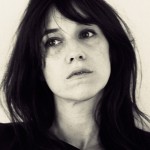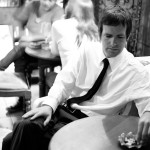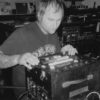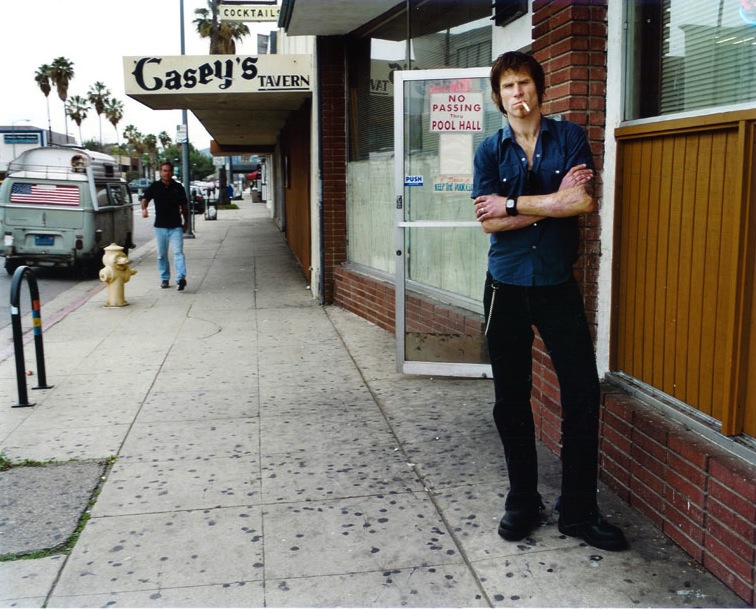
AN APPEARANCE IN THE PARK
A halting conversation with Mark Lanegan
By J. Bennett
When we meet Mark Lanegan at a picnic table in a nearly-empty public park in Burbank, it feels like one of us should be carrying a briefcase full of money. Like there might be a sniper in the bushes, watching two guys in sunglasses make some sort of shady handoff. But really it’s just awkward, mostly because Lanegan clearly doesn’t want to be here, and essentially says as much before we even start the interview. A notoriously reluctant and guarded interviewee, he presumably picked the spot because it’s close to where he lives but not so close that we might actually get a glimpse of his pad. Fair enough, we figure: Privacy is a precious commodity these days. Still, there’re a lot of painful pauses and one-word replies, many (but not all) of which were edited out of the following transcript. But first, some basic facts…
As the singer of the Screaming Trees in the ’80s and ’90s, Lanegan just might be the only Seattle frontman who both made it through the grunge era alive and the aughts with his musical dignity intact. Aside from a brief stint in North Carolina–where he says he lived so far out in the sticks that he had to drive 20 minutes just to get coffee–he’s resided in Los Angeles for most of the last 15 years. And he’s done a lot of moving around, even here–from Pasadena to North Hollywood to the Hollywood Hills to Echo Park to Glendale and finally to Burbank.
Lanegan is either unwilling or unable to explain his inability to settle into one place, but it might not be a coincidence that his musical path mirrors his domestic restlessness. Over the course of the last decade and a half, he’s recorded multiple albums–nearly all of them superb–with the likes of Queens of the Stone Age, the Gutter Twins, the Twilight Singers, ex-Belle & Sebastian songstress Isobel Campbell and English electro-gospel gurus Soulsavers while releasing five excellent solo albums, marking each with his own inimitable and smoky singing style. His latest solo record–which, like 2004’s haunting Bubblegum, appears under the banner of the Mark Lanegan Band–is entitled Blues Funeral.
“I probably thought everyone was a cop back then”
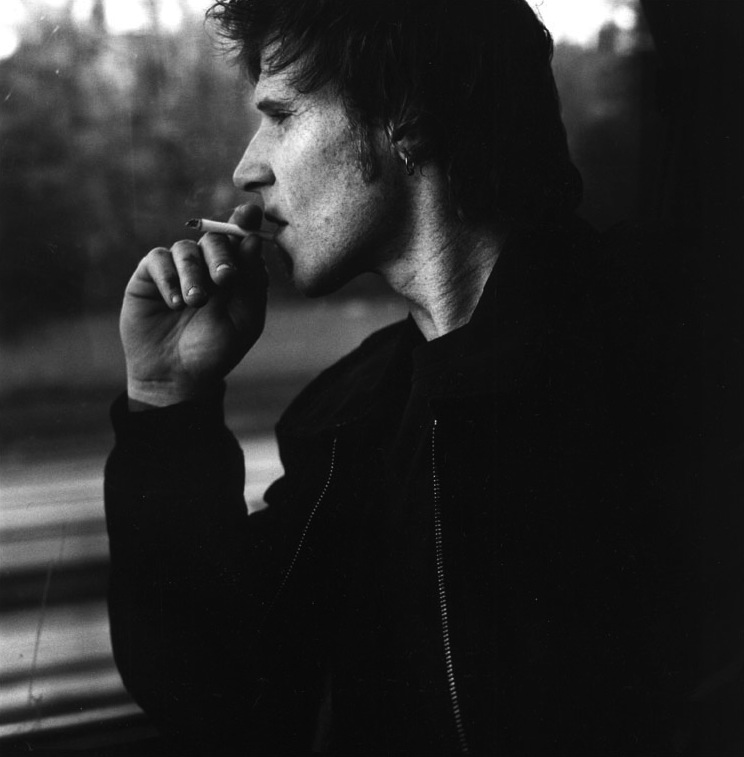
self-titled: Do you play or write music every day?
I used to. Now I pretty much only do it when I have something to write for. And then, I approach it like it’s work. I get up in the morning and do it.
Does the fact that it’s work take any enjoyment out of the process?
Well, I’ve been making music for a living for a while, so that would mean that the enjoyment went out of it like 20 years ago. [Laughs]
Does making music mean something different to you since it’s become a career?
Well, for a long time I was just figuring out how to do it. I was in the Trees for a long time, and made a lot of records before I even started really writing songs. It was kinda like that Rush song about the guy who discovers a guitar in his hands. “What is this piece of wood?†It’s kinda like that for me. I’m not really proficient on any instrument, but I know enough chords to write a song. I learned how to play stuff out of necessity. I’m still figuring it out, really.
So you write mainly on the guitar?
With this record, I wrote a couple of them on the keyboards and some with a synthesizer and drum machine, just to give it a different angle. But then I hand all that stuff over to a guy who can really play. But yeah, mainly guitar.
Did you write all the songs on Blues Funeral yourself?
Yeah, with the exception of “Ode to Sad Disco,†which came from a series of films by a Danish director, Nicolas Winding Refn, called The Pusher trilogy. The second film has a great soundtrack, and there’s a piece of music in there called “Sad Disco,†so I lifted the music and wrote my own song to it. Hence the title, “Ode to Sad Disco.†So that’s the only one that wasn’t specifically written by me.
What other kinds of things inspired the songs on Blues Funeral?
Well, I try to be open to inspiration no matter what I’m doing. For a large part, stuff starts from memory. Maybe a real experience, maybe somebody else’s experience, maybe something I heard about. I don’t know. Or it could be other people’s music. Wherever the spark comes from, I can’t really give any specific examples, although I’m sure there are some. I really don’t even think about where it comes from. I just let it go where it’s going and don’t really question it too much. I think it just comes from life in general.
Like your last solo album, Blues Funeral has some electronic elements–they’re especially present on “Ode To Sad Disco†and “The Gravedigger’s Song.†Do you program that stuff yourself?
That stuff was mostly done by Alain Johannes on this record.
Is that something you specifically wanted to incorporate, or did it just work out that way?
We started to incorporate it on the last record, but with this one I wanted to use it in a less noisy or abrasive way, which is how I’ve used it in the past. This time, I wanted it to be more unabashedly beautiful. But those elements are things that people have been using since the ’60s, really, so it’s nothing new.
The press release for the new album says you have two dogs. Why did you want to include that information?
Well, the record company had somebody write a bio, and it was really long and really:well, personal. It was filled with facts that bored the shit out of me, and it also included a review of the record for people who were gonna review the record. It drew my ire immediately, so I wrote a really brief bio, just a couple of lines long. At the end, trying to be funny, I put in that I live in Los Angeles and have two dogs. That was the personal aspect of it. I didn’t really intend for them to use that–especially not the dog part–but they did.
It reads like a statement of exactly how personal you’re willing to get.
[Smiles and turns palms upwards]
You recently recorded a Johnny Cash song for the Hangover II soundtrack. Was that something you had kicking around?
No, they specifically asked me to do it for the movie. The Cash version is actually a cover of a Nick Lowe song, but the Cash one is the definitive version. When they asked me to do it, I thought, “Okay, but it definitely won’t sound like Johnny Cash.†[Laughs]
Were you hesitant to do a song for a movie that’s essentially a goofball comedy?
No, I’ll pretty much do a song for anything. Back in 1986, maybe I thought that was something that reflected on me. But in 1986, I was also afraid of having a record that sounded good. But music is music. If it’s anything remotely in the ballpark of something I can handle, I’ll usually think about doing it, at least.
You’ve been more prolific than ever in the last few years–making music on your own, with Isobel Campbell, Greg Dulli, Soulsavers, Queens. What do you attribute that to?
I’ve just been blessed with a lot of opportunity in the last ten years or so. That’s just the way it’s panned out. I can’t really tell you why. I’m glad it has, though, because I’ve enjoyed the music I’ve made and I’ve enjoyed playing with different people. But you’d have to ask someone else why that is.
Obviously, all those people I just mentioned play different styles of music. Do you specifically seek out projects with different styles to challenge yourself?
Well, I’d say for the most part that they seek me out. But the things I’m interested in are definitely things that I probably wouldn’t do left to my own devices. But then again, I guess what I’d do when left to my own devices is anyone’s guess at this point. [Laughs] But generally the criteria is that it’s someone whose music I enjoy without me being involved in it. It’s really not much deeper than that.
Do you feel less pressure in projects for which you’re not writing the music?
Well, there’s pressure in every situation. I’m not sure writing my own music changes that.
Do you work on your own material while working in these other projects, or do you generally concentrate on just one thing at a time?
It depends. I usually have several things going at once, and just concentrate on whichever one is most pressing–the one that’s gotta be finished soonest. Right now I’m just working on stuff for myself because I don’t really have much else going on. Although I’m kinda working on Gutter Twins stuff at the same time.
Are you involved in the new Queens record that’s reportedly in the works?
No.
Are you doing anything with Soulsavers?
No.
Isobel Campbell?
No.
Do you have a backlog of material–stuff that hasn’t come out or isn’t quite finished?
Well, there was an entire bag of cassettes that I’d been carrying around for years–some of them were songs, some weren’t quite songs yet, and whenever I was working on something, I’d reach into the bag. But when I went to do that for this record, they were all de-magnetized from all the moving around I’ve done. So I have a few new cassettes, but I just got a new digital thing. I haven’t figured out how to work it yet, though.
Is there anyone left on your wish-list of people you’d like to collaborate with?
I’m sure there’s a million of them. If Brian Eno asked me to do something, I probably wouldn’t say no. But that’s probably not likely to happen. He’d be great to work with, though.
The long-lost final Screaming Trees record, Last Words: The Final Recordings, was released last year. Are you happy that it’s out?
Let me clarify that that was not a record and it was never meant to be a record. It was from different demo sessions done over a period of two years. I’m fine with it coming out; I thought the songs were okay. The other guys really wanted it to happen, but it wasn’t a record. When I listened back to the songs, I was surprised that I thought they were as good as they were.
Do you stay in touch with those guys at all?
Sure, we send texts at the holidays and stuff. We talk occasionally. We’re like family.
But you’d never play shows with them again?
As Screaming Trees? I’d never say never, but I’m pretty damn sure it’d be never. [Laughs] You gotta really want to do that. We played together for so many years, and enough’s enough, really.
What kind of things have you been listening to lately?
Whenever somebody asks me that, I immediately draw a blank. [Laughs]
Okay, let’s talk about Queens. Your MO in that band was to walk onstage, sing three or four songs, and then walk off. It seemed like the best job in rock n’ roll. Was it that way for you?
Absolutely. [Laughs] When Josh [Homme] first asked me to do it, I thought it was crazy. But I quickly took to it. It’s a great job if you can get it. [Laughs] Have we met before?
Yes.
In those days?
Yes.
You were on Lollapalooza. I remember you.
Yeah, you told me you thought I was a cop.
[Laughs] I probably thought everyone was a cop back then. Don’t take it personally.
I didn’t understand that–I had long hair back then. I looked even less like a cop than I do now.
That’s how you were trying to get me.
You know, the impression I get from your records:I don’t know if this is going to make sense to you, but it’s like someone is telling you about not their private life but rather their inner life, the life of the mind–but not in forthright terms. It’s up to the listener to decode what’s really being said. Does that seem even vaguely accurate to you?
I couldn’t tell you. I think it’s cool that you think that, though, if that’s how it strikes you. I know that the music I enjoy usually has some element of mystery to it, where I’m left to draw my own conclusions and so on. If that’s the way the music I’m making strikes someone else, I think that’s fantastic.
You strike me as a very serious guy. Are you, or does it just seem that way because we don’t know each other very well?
It’s because we don’t know each other very well. I’m not David Caruso on, uh: goddamn, what is that fuckin’ show, where he’s so serious at all times, like: “I will catch you!”? CSI: Miami, that’s what it is. I’m not like him.
Does music in general mean something different to you now than when you started?
Not really. There’s two kinds of music in my life–the music I’m making, that I’m part of, and the music that I’m listening to for personal enjoyment. That’s never changed. The music I’ve been a part of has changed a bit over the years, and I think I’m finally figuring out how to do it in a natural way. But the music that I listen to as a music fan, that’s always been the same, luckily. That’s why I started making music in the first place.

